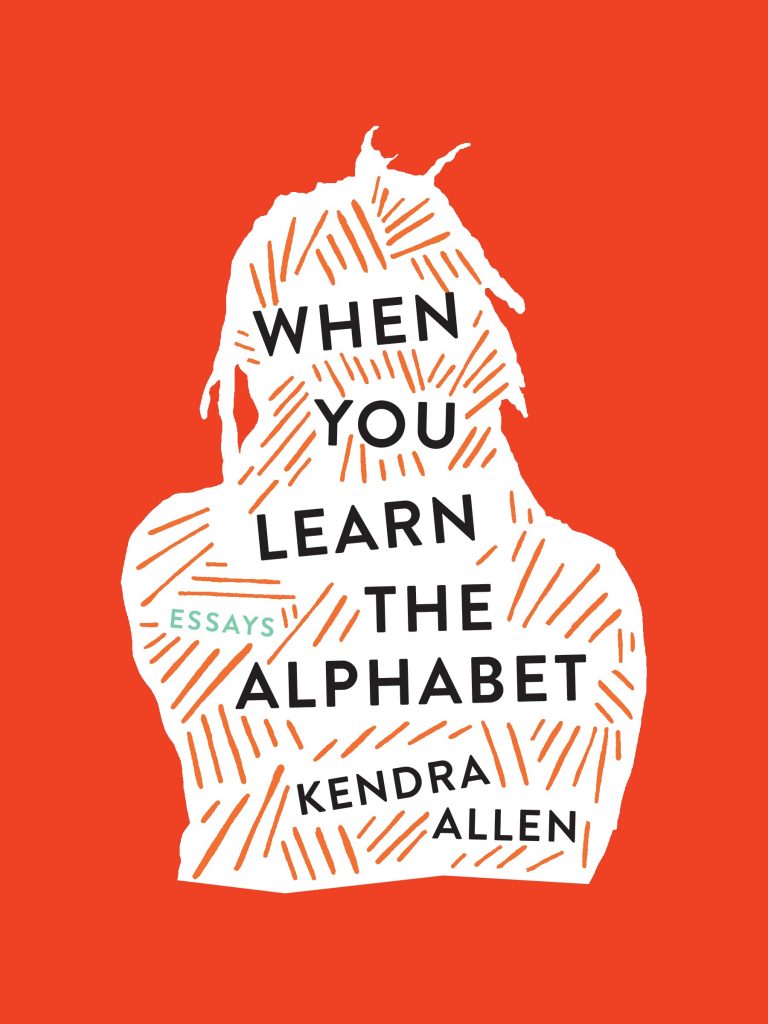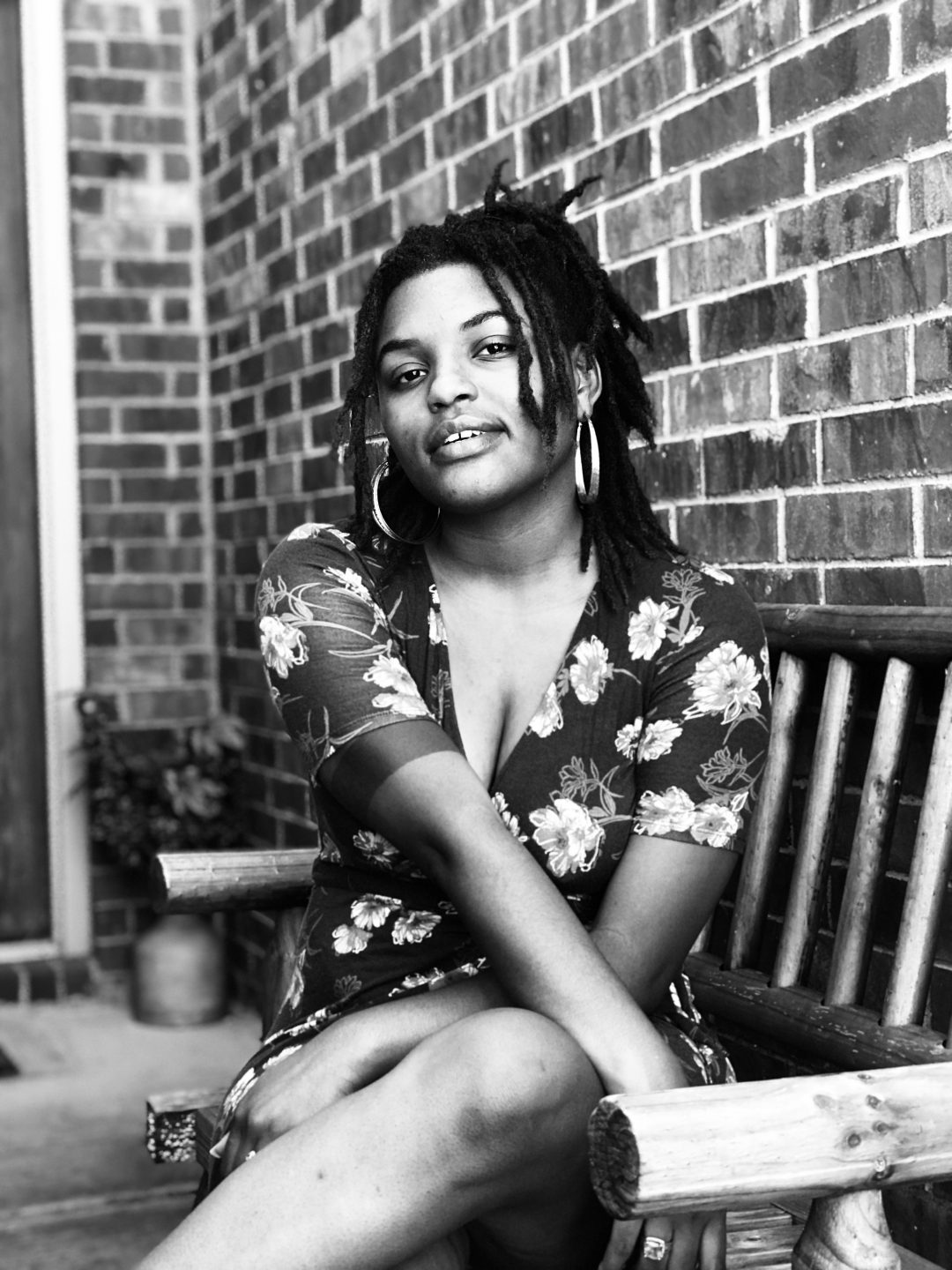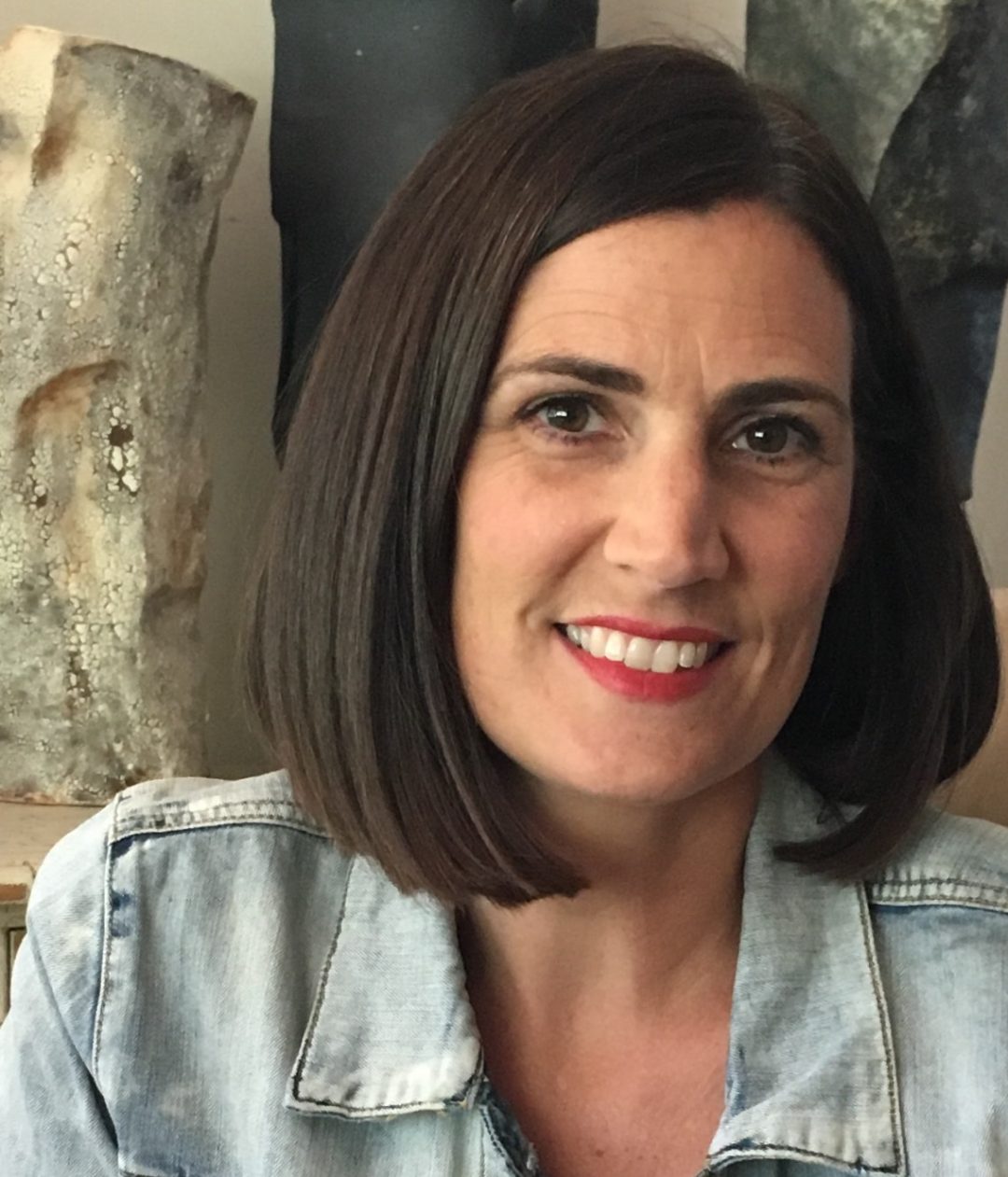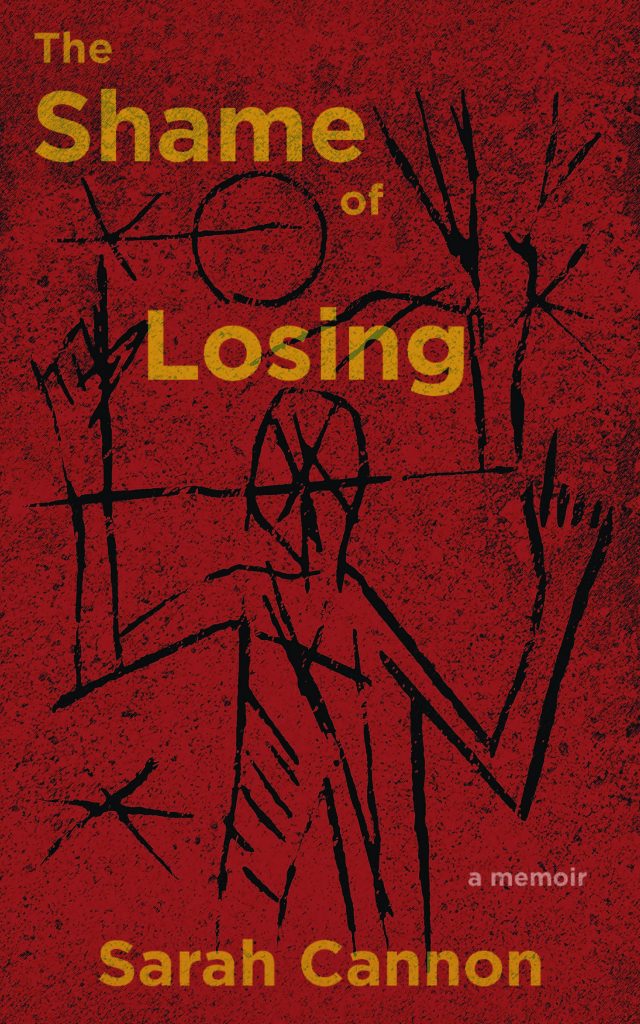When You Learn the Alphabetis Texas native and Columbia College Chicago alum Kendra Allen’s debut essay collection.

I met with Kendra Allen at a coffee shop, near her alma mater in the South Loop. The following exchange was edited for length and clarity.
Ruby Orozco: Can you talk about the process of writing the essays in this collection?
Kendra Allen: It was not on purpose; most were written during my undergrad at Columbia College Chicago. The collection contains about twenty essays, some poetry, but nineteen of those I wrote here in undergrad. It was just like I’m completing my class assignments because I have to write stuff in order to graduate. (Laughs) I noticed that my entire time at Columbia was like the first time my generation was seeing injustices of people of color thrown in our faces; I was writing about the same things for four years.
I could not stop writing about race, my dad, my family, and about what happened with Michael Brown. It kind of came together like that. I never thought I was writing a book. I was just doing my writing assignments.
RO: What are you writing about now?
KA: I gotta do my [MFA] thesis¾you’re in grad school, right?
RO: Yeah, I am also going into my thesis year.
KA: My thesis is a passion project I really want to do. It’s about the myth of virginity and how we say that virginity is a broken hymen when that’s not true: you can break your hymen in a lot of different ways and then your hymen has an opening. . . . There are different types of hymens. Some of them have different openings in them. [The broken hymen] is all a myth that controls women and our sexuality.
RO: It definitely does. I also grew up with those myths about virginity.
KA: I did a lot of research about virginity myths, so that’s something I really want to write about, but I don’t think I can do it in a year. So, I think I am going to do a poetry collection on the desegregation of swimming pools in Alabama. They wouldn’t let Black kids go into the pool with white kids, but if the white kids were drowning, then they wanted the Black kids to help them. Everything in Alabama is named after the Black Warrior River. The school magazine is Black Warrior Review.So, it’s like everything is named after this river, but no one talks about all the slaves that died in it, how all the frat houses are old plantations, and how many of the trees near campus had people hanging from them.
RO: Was religion a really big factor in your childhood?
KA: Yeah, growing up I would go to church four times a week for no reason. My mom got back into church when she had me¾she was almost 30. I grew up in a Baptist church; it was my uncle’s church and everyone knew everybody. I heard things like, “You can’t wear this, and you can’t wear that.” If I came to the church with a skirt on and no stockings, it was always like, “What are you doing?” And I was a kid, you know? Why does it matter? And why are you telling gay people that they are going to go to hell? It’s weird. I grew up in church but I’m not that religious.
RO: On page seventy-two of your book, you write, “I want to talk about anything other than what we’re comfortable talking about.” Can you talk a little bit about that?
KA: When my family and I get together, I’m known as the radical one, so whenever I say anything, they are always like, “Okay, here she goes.” And I am like, “Can we talk about how all the men in this family are misogynistic and put women down?”
The women tell other women how they gotta act in order to get men. My family was raised to remain silent about issues, and that’s the problem. I just want us to be very aware, and I am never going to stop talking about these things.
RO: And you shouldn’t stop talking about these topics especially since people of color are always being left out of these conversations.
KA: And that’s the thing about being a writer. There are different subjects that you have to talk about and you have to be willing to talk about them, especially as a woman writer because nobody else will.
RO: Are you exhausted or energized when you write? How do you feel after you write or as you are writing?
KA: I feel the most energized when writing, because I feel like I finished something. That is the best feeling about writing. I feel like I am done even though I know it’s never done. It’s the hardest thing starting something. I don’t need to know the complete story of what I’m going to write when I start. I just figure it out as I’m writing.
It’s kind of like the game Tetris¾I’m always trying to put the pieces together and try to make them fit until they do.
I am not like a long essay writer; I tap out at around twelve pages.
RO: I’m the same way. I don’t have any more to say past twelve pages. I also write shorter pieces. I admire the way you just say stuff in your writing. It feels like you say what you want without really caring how anyone will respond, and I think that’s really cool.
KA: Oh, thank you, thank you.
RO: That’s something I really struggle with just because I feel guilt-ridden about what I’m talking about, especially since I talk a lot about my mom and often think to myself, “Oh is it okay to say that? Is it my story to tell? Should I be saying these things?”
KA: Yeah, that’s a real fear. That’s something I struggle with, especially in terms of my dad. Like me and my dad have just gotten into a better relationship in the past two to three years, but in his mind he’s thinking, “Why would she still be mad about this?”
But accountability, you know? Just because we are cool doesn’t mean this stuff didn’t happen. And he told me I villainized him in the entire book and it went back to us not speaking.
So, I would say that because you write a lot about your mom, you should have a conversation with her and let her know what you’re writing about and ask her questions about what she remembers and feels. But be okay with what you write before you show anybody else because you could be made to change your mind and change the whole perspective. My advice is to keep writing about your mom.
RO: In many of your pieces you play with form. Two specifically that intrigued me were, Legs on his Shoulders, and Boy is a White Racist Word. Can you talk about the form of those essays?
KA: Yeah, Legs on his Shoulders, was written in Jenny’s [Boully] class. I was inspired by Kanye West and how a lot of people be looking up to this man and will make a lot of excuses for him. Of course, he has a lot of mental health issues and I get that, but I like to keep him accountable. It was inspired by Kanye because I was just like, “Oh my God, is this the man that made the albums Graduationand Late Registration,which I listened to, and how do I feel about listening to it now? I went into that essay thinking I wanted to have a rhythm to it. I also wanted it to have repetition, and I talked to a lot of women about conversations on their boyfriends’ and husbands’ expectations. I love the spacebar. I don’t like how it looks in standard essay form, so I thought about how I can break it up to make it flow and it felt like I was teaching myself poetry.
ForBoy is a White Racist Word,that didn’t start off as columns. It was only one column and I felt like it was too long with too much white space, and it all came down to “I just really wanted it to look nice more than I am doing this on purpose.”
RO: So, you also write poetry?
KA: I try (laughs). It’s not that good, but I want to get good.
RO: Could you talk about the title of your collection?
KA: It’s named after the essay When you Learn the Alphabetand I remember getting the idea for it during poetry class my sophomore year in undergrad. That semester, I had a nonfiction workshop and then I also had a poetry workshop.
I wrote a draft in, like, two hours and then I went to class and during class I wasn’t paying attention I was just writing and thinking about what I can do for this essay. I just remember it becoming a metaphor and it became one for the whole book: Lessons I learned throughout different seasons. I was also thinking about how albums usually have a title from one of the songs in the collection.
RO: I think it’s really cool how music has inspired your writing. What do you see next after grad school?
KA: What do yousee next?
RO: Oh, I don’t know either. It’s such a weird question. I came to grad school to seek answers.
KA: I didn’t come to grad school to seek answers. I came out of fear. After I graduated undergrad I was like, “What am I going to do now?” And I wouldn’t have known you can go to grad school. I thought I ain’t got money to go to school and then I talked to Jenny Boully, and she told me yes there are fully funded programs.
A lot of people think you need to go to grad school to write and make it as a writer, but my advice is to just write. For me, grad school has been really hard and I am just going to be happy when it’s over (laughs). I don’t even think it’s hard work, it’s just hard being there. I’m kind of over school. In a dream world I could get my thesis published, but it’s all poetry so I won’t make a lot of money. I am just happy that this even happened. [publishing my book] I would really like to be a writer for a living, but it’s really, really hard. People don’t read like that anymore.
RO: Yeah, that’s unfortunate.
KA: I will probably find non-profit work, just something that will allow me time to write.
RO: Can you tell me when you found out that writing and language was powerful?
KA: When I changed my major for the third time . . . (laughs). I always knew words were important and I have always been the person listening to music for the lyrics more than the music. I always questioned, “Why do I like the song?” So, I have always studied musical lyrics. Do you know who Jhené Aiko is?
RO: I love her!
KA: She was a huge influence on me. I was obsessed with her in high school because that’s when her mixtape came out and I was like, “Oh my God, I want to put words together the way she does.”
I thought I was going to be a music journalist and that’s why I came to Columbia. I didn’t even know what Creative Writing was. When I got into my first writing workshop class, it was during my sophomore year and the professor was telling us about the essay. I remember thinking, “I don’t want to write essays.” But then she introduced us to the personal essay.
We read How to Slowly Kill Yourself and Others in America, and that changed my whole life. That made me realize I could speak how I speak, talk like where I am from, and use music the way I want. I didn’t realize people wrote essays like that, and that made me think, “Oh, I can do this. I can write an essay just as well as Jhené writes lyrics, or just as well as Stevie Wonder writes a song.”
RO: Are musicians your biggest inspirations?
KA: For sure! I tell people that all the time about myself. My favorite writers write songs. If I am making a list of my favorite writers, then they are all going to be people who write songs because it’s amazing how they use metaphors.
I always bring up Lil Wayne, although he is very problematic now, but when I was a kid, he changed my life. I listen to a lot of rap music. I think like a rapper in my head. I ask, “What did Lil Wayne say and how did Nas tell thisstory?” And then I will go from there.
Interview by Ruby Orozco
____________________________
Ruby Orozco is a Chicago native and is currently working on her MFA in Creative Nonfiction at Columbia College Chicago. This is her first publication. When she is not writing or working, she enjoys time with her friends and family.
Author photo: Carla Yvette Lee



